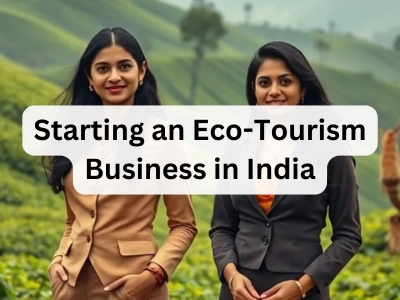Starting an Eco-Tourism Business in India: A Complete Roadmap for Success
 India’s eco-tourism industry is on the rise, driven by a growing awareness of sustainable travel and the country’s rich biodiversity. Recent trends indicate a shift towards eco-friendly travel experiences, with tourists seeking destinations that prioritize environmental conservation. With the eco-tourism market projected to grow at a CAGR of 15% globally, starting an eco-tourism business in India offers immense potential for profitability and long-term success. To explore how to start a business in India, refer to our comprehensive guide.
India’s eco-tourism industry is on the rise, driven by a growing awareness of sustainable travel and the country’s rich biodiversity. Recent trends indicate a shift towards eco-friendly travel experiences, with tourists seeking destinations that prioritize environmental conservation. With the eco-tourism market projected to grow at a CAGR of 15% globally, starting an eco-tourism business in India offers immense potential for profitability and long-term success. To explore how to start a business in India, refer to our comprehensive guide.
Why Starting an Eco-Tourism Business in India is a Smart Move

Eco-tourism focuses on creating sustainable travel experiences that conserve the environment and benefit local communities. In India, the scope of eco-tourism is vast, encompassing nature reserves, wildlife sanctuaries, and rural tourism. The growing demand for eco-friendly travel, coupled with changing lifestyles and increased environmental awareness, makes this a thriving industry in India. For assistance in company formation, visit our incorporation services page.
Reasons to Start This Business

- The eco-tourism market in India is expanding, driven by domestic and international travelers seeking sustainable travel options.
- Government initiatives like “Incredible India” and “Dekho Apna Desh” promote eco-tourism and offer subsidies for eco-friendly projects.
- India’s diverse geography, from lush forests to serene backwaters, provides endless opportunities for eco-tourism ventures.
- Success stories of eco-tourism operators highlight the profitability and positive impact of this business model. Learn more about India company registration.
Why You Should Start an Eco-Tourism Business in India

India is a regional hub for eco-tourism, offering unparalleled opportunities for entrepreneurs. With a growing middle class, increasing disposable incomes, and a strong emphasis on sustainability, the eco-tourism sector is poised for growth. Businesses like eco-lodges and community-based tourism projects have thrived in India, showcasing the potential for success in this industry. For professional assistance, check out our incorporation services in India.
Detailed Steps to Establish Your Eco-Tourism Business

1. Pre-establishment Phase
Begin by conducting thorough market research to understand the demand for eco-tourism in your chosen location. Identify your target audience, such as eco-conscious travelers or adventure seekers. Analyze competitors to determine their strengths and weaknesses, and choose a business model that aligns with your goals. Selecting the ideal location is crucial—focus on areas with natural beauty, biodiversity, or cultural significance. Learn more about 3E Accounting and how we can help you achieve your business goals.
2. Business Setup
Choose the legal structure of your business, such as a sole proprietorship, partnership, or LLP. Register your business with the Ministry of Corporate Affairs and obtain a GST registration. Depending on your operations, you may need additional permits, such as forest department approvals or environmental clearances. Set up the necessary infrastructure, including eco-friendly accommodations and facilities, while ensuring minimal environmental impact. For professional guidance, explore our company secretary services.
3. Operational Planning
Allocate resources effectively, including hiring staff trained in eco-tourism and sustainable practices. Invest in technology, such as online booking systems and digital marketing tools, to streamline operations. Develop standard operating procedures (SOPs) to maintain quality and consistency in your services. For payroll management, consider India payroll services.
4. Marketing and Business Development
Focus on building a strong brand identity that emphasizes your commitment to sustainability. Leverage digital marketing channels, such as social media and search engine optimization (SEO), to attract eco-conscious travelers. Partner with local communities, NGOs, and travel agencies to expand your reach. Establish a strong online presence through a professional website and customer reviews. For financial management, check out our accounting services.
Local Regulations and Licensing

Starting an eco-tourism business in India requires compliance with various regulations and obtaining necessary licenses. Here are some key requirements:
- Environmental Clearance: Obtain approvals from the Ministry of Environment, Forest, and Climate Change for operating in protected areas.
- Tourism License: Register with the Ministry of Tourism to gain recognition and access to government incentives.
- Forest Department Permits: Secure permits for activities conducted in forested or wildlife areas.
- Employment Laws: Comply with labor laws, including minimum wage requirements and employee benefits. Learn more about business advisory services to navigate regulations efficiently.
Challenges and Considerations

While the eco-tourism industry offers significant opportunities, it also comes with challenges. Here are some considerations:
- Market Competition: Compete with established players by offering unique and high-quality experiences.
- Resource Management: Ensure sustainable use of natural resources to avoid environmental degradation.
- Cultural Sensitivity: Respect local traditions and involve communities in your operations.
- Regulatory Compliance: Stay updated on changing regulations and ensure full compliance. For bookkeeping needs, explore bookkeeping services in India.
Financial Planning Aspects

Effective financial planning is crucial for the success of your eco-tourism business. Here are some key considerations:
- Initial Investment: Budget for land acquisition, infrastructure development, and marketing expenses.
- Operating Costs: Include staff salaries, maintenance, and utility expenses in your financial plan.
- Funding Options: Explore government grants, bank loans, or venture capital for financing your business.
- Revenue Projections: Estimate income from accommodation, tours, and other services to create a break-even analysis.
Additionally, consider tax benefits and incentives offered by the government for eco-friendly businesses. For advanced financial tools, explore AI accounting software.
Conclusion
Starting an eco-tourism business in India presents a unique opportunity to combine profitability with environmental conservation. With the right planning and execution, you can create a sustainable and successful venture in this growing industry.
Ready to Start Your Eco-Tourism Business?
At 3E Accounting India, we specialize in helping entrepreneurs establish and grow their businesses. From business registration to financial planning, our experts provide end-to-end support for your eco-tourism venture. Contact us today to schedule a consultation and take the first step towards building your dream business.
Explore our resources and guides, such as the importance of a business plan, to gain deeper insights into the eco-tourism industry. For HR management needs, consider HRMS software. Let us help you turn your vision into reality and make a positive impact on the environment and local communities.

Frequently Asked Questions
What is eco-tourism, and why is it important?
Answer: Eco-tourism focuses on sustainable travel that conserves the environment and benefits local communities. It is vital for promoting biodiversity and reducing the carbon footprint of tourism.
What are the key steps to start an eco-tourism business in India?
Answer: The key steps include market research, choosing a location, registering your business, obtaining necessary permits, and setting up eco-friendly infrastructure. Learn more about starting a business in India.
Do I need special permits to start an eco-tourism business?
Answer: Yes, you may need environmental clearances, forest department permits, and tourism licenses depending on your chosen location. Visit our India company registration guide for more details.
How can I ensure my eco-tourism business is sustainable?
Answer: Focus on eco-friendly practices like using renewable energy, conserving water, and involving local communities in your operations. Sustainability is key to long-term success.
What are the financial requirements to start an eco-tourism business?
Answer: Initial investment includes land acquisition, infrastructure setup, and marketing. Explore accounting services to manage your finances effectively.
How can I market my eco-tourism business?
Answer: Use digital marketing strategies like SEO, social media, and partnerships with travel agencies. A strong online presence is crucial for attracting eco-conscious travelers.
What legal structure is best for an eco-tourism business?
Answer: The legal structure depends on your needs, such as a sole proprietorship, partnership, or LLP. For guidance, check out our company incorporation services.
How can 3E Accounting help me start my eco-tourism business?
Answer: We provide end-to-end services, including business registration, financial planning, and compliance. Learn about our expert team and how we can assist you.

